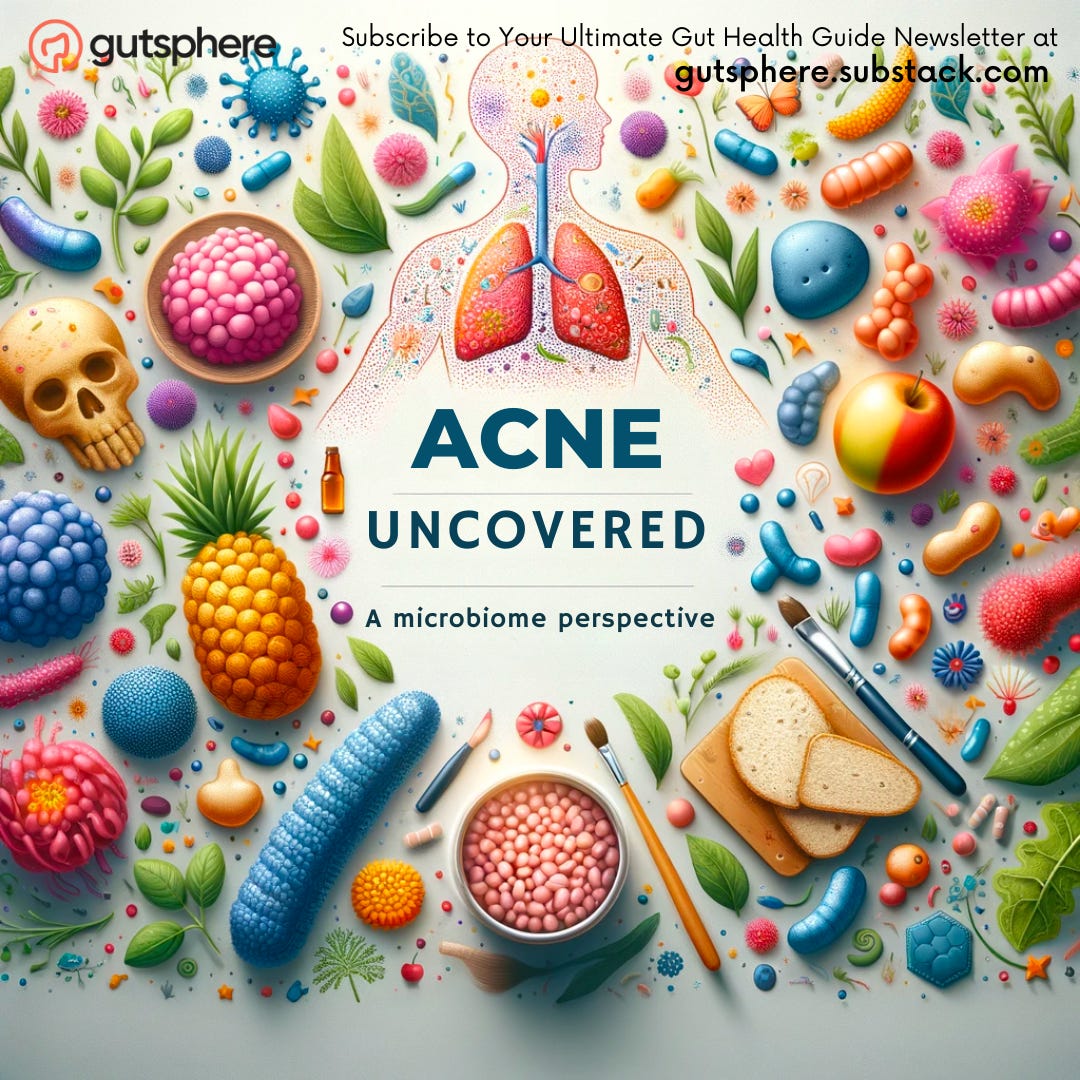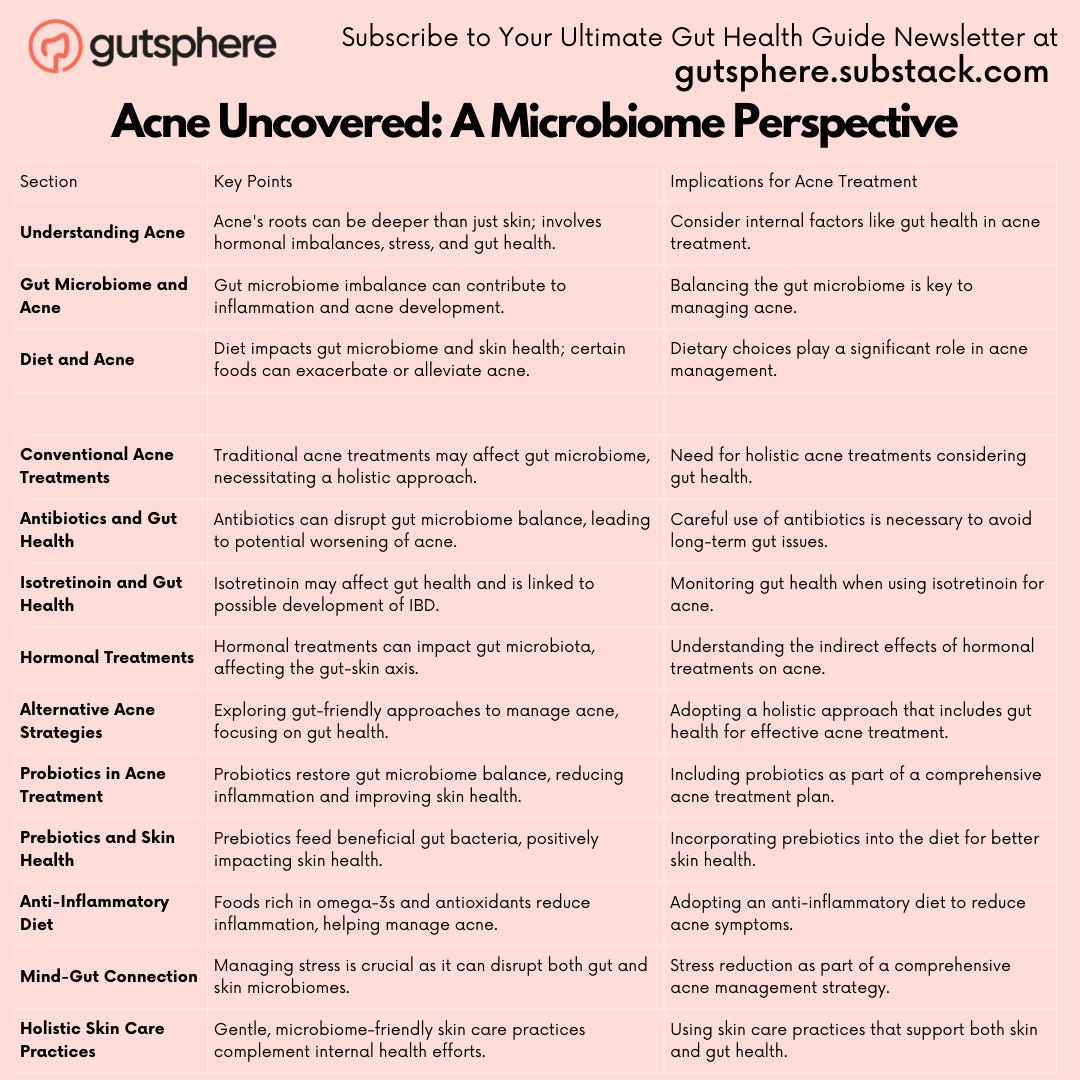Acne Uncovered: A Microbiome Perspective
Delve into how the gut microbiome influences acne
Part 3: "Acne Uncovered: A Microbiome Perspective" - Section 1
Welcome to Part 3 of 'Gut to Skin' Series
In this enlightening segment, titled "Acne Uncovered: A Microbiome Perspective," we dive into the intricate relationship between the gut microbiome and acne, a prevalent skin condition affecting millions worldwide. Our journey explores how this internal ecosystem influences acne and how conventional treatments for acne might impact gut health.
Understanding Acne: More Than Skin Deep
Acne is often viewed solely as a skin issue, but its roots can run deeper. It's not just about clogged pores or surface bacteria; it's also about what's happening inside our bodies. Hormonal imbalances, stress, and particularly our gut health, play significant roles in acne development.
The Gut Microbiome: A Central Player in Acne Development
Our gut is home to trillions of bacteria, fungi, and other microbes. This microbiome is not just a passive resident; it actively participates in our body's metabolic processes, including those that influence skin health. An imbalanced gut microbiome, known as dysbiosis, can contribute to inflammation, a key factor in acne development.
Linking Diet to Acne
What we eat significantly impacts our gut microbiome's composition and, in turn, our skin health. Diets high in processed foods, sugars, and dairy can exacerbate acne by promoting inflammation and disrupting the gut flora. On the other hand, a diet rich in fiber, antioxidants, and healthy fats can support a balanced microbiome, potentially alleviating acne symptoms.
Conventional Acne Treatments and Their Impact on Gut Health
In this section, we'll explore how traditional acne treatments may influence our gut microbiome, highlighting the need for a more holistic approach to acne management.
Antibiotics: A Double-Edged Sword
Antibiotics are commonly prescribed for acne due to their antibacterial and anti-inflammatory properties. However, while they can be effective against acne-causing bacteria on the skin, they don't discriminate in the gut. Broad-spectrum antibiotics can disrupt the delicate balance of our gut microbiome, leading to a reduction in beneficial bacteria and an increase in harmful microbes. This dysbiosis can exacerbate inflammation throughout the body, potentially worsening acne in the long run.
Isotretinoin and Gut Health
Isotretinoin, known for its effectiveness in severe acne, has been linked to changes in gut health. Some studies suggest a potential association between isotretinoin use and the development of inflammatory bowel disease (IBD), although this remains a topic of ongoing research and debate. The exact mechanism of how isotretinoin affects the gut microbiome is not fully understood, but it underscores the importance of considering gut health when treating acne.
Hormonal Treatments and the Microbiome
Hormonal treatments, another cornerstone in acne therapy, especially in women, can also influence gut health. Oral contraceptives, often prescribed for hormonal acne, can impact the gut microbiota composition. While the direct effects on acne are still being researched, the hormonal shifts caused by these medications can indirectly affect the gut-skin axis.
Embracing Alternative, Gut-Friendly Acne Management Strategies
In this concluding section, we explore gut-friendly, holistic approaches to managing acne, emphasizing the importance of nurturing our gut health as part of an effective acne treatment plan.
Probiotics: Allies in Acne Treatment
Probiotics, the beneficial bacteria that support gut health, can play a pivotal role in managing acne. By restoring balance to the gut microbiome, probiotics can reduce inflammation and improve skin health. Incorporating probiotic-rich foods like yogurt, kefir, and fermented vegetables into the diet, or considering a high-quality probiotic supplement, can be a valuable part of an acne management strategy.
Prebiotics: Feeding the Good Bacteria
Prebiotics, the non-digestible fibers that feed beneficial gut bacteria, also deserve attention. Foods rich in prebiotics, such as garlic, onions, bananas, and asparagus, help maintain a healthy gut environment, which can positively impact skin health.
Anti-Inflammatory Diet: Soothing from Within
An anti-inflammatory diet, rich in omega-3 fatty acids, antioxidants, and low in processed foods and sugars, can significantly benefit individuals with acne. Foods like salmon, nuts, seeds, and leafy greens can reduce inflammation in the body, including the skin, helping to manage acne symptoms.
Mind-Gut Connection: Managing Stress
Stress management is an often-overlooked aspect of acne treatment. Chronic stress can disrupt both the gut and skin microbiomes. Engaging in stress-reducing activities like yoga, meditation, or simply ensuring adequate sleep can help maintain the balance of the gut microbiome, indirectly benefiting skin health.
Holistic Skin Care Practices
In addition to dietary changes, adopting holistic skin care practices can be beneficial. Gentle cleansing, avoiding harsh chemicals, and using non-comedogenic, microbiome-friendly skin care products can help preserve the skin's natural barrier and microbiome.
Conclusion
As we conclude our deep dive into the intricate relationship between acne and the gut microbiome, it's clear that addressing skin health requires more than just surface-level treatments. The journey through "Acne Uncovered: A Microbiome Perspective" has illuminated the significant impact our gut health has on our skin, particularly in the context of acne.
Next
Part 4: Eczema, Psoriasis, and Rosacea - A Gut Connection
Request
Share
Our sincere request to you is to share the newsletter with your friends, family, and community so that they can benefit from the content. Also it will help us grow the newsletter, and eventually, as we release more content, digital tools, and more we will enable people around the world to live chronic disease free.
Subscribe
Feedback
Also, please give us feedback so that we can improve the content. And if there are any topics that you want us to cover please send us your questions and topics. Furthermore, if you try any of the things we provided information please share your experience with us.
Thank You
GutSphere Team
Disclaimer
Please note that the information provided in this newsletter is for informational purposes only and should not be considered as a substitute for professional medical advice, diagnosis, or treatment. If you have any concerns or questions about our health, please consult with a licensed healthcare professional. The information contained in this newsletter is not intended to diagnose, treat, cure, or prevent any disease. The publisher and authors of this newsletter assume no responsibility for any adverse effects that may result from the use of the information contained herein.
Share
Previous



